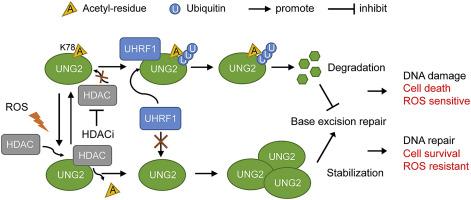Free Radical Biology and Medicine ( IF 7.4 ) Pub Date : 2020-07-07 , DOI: 10.1016/j.freeradbiomed.2020.06.010 Yantao Bao 1 , Lili Tong 2 , Boyan Song 3 , Ge Liu 2 , Qian Zhu 2 , Xiaopeng Lu 2 , Jun Zhang 2 , Ya-Fei Lu 2 , He Wen 2 , Yuan Tian 2 , Yujie Sun 4 , Wei-Guo Zhu 5

|
Cancer therapeutics produce reactive oxygen species (ROS) that damage the cancer genome and lead to cell death. However, cancer cells can resist ROS-induced cytotoxicity and survive. We show that nuclear-localized uracil-DNA N-glycosylase isoform 2 (UNG2) has a critical role in preventing ROS-induced DNA damage and enabling cancer-cell resistance. Under physiological conditions, UNG2 is targeted for rapid degradation via an interaction with the E3 ligase UHRF1. In response to ROS, however, UNG2 protein in cancer cells exhibits a remarkably extended half-life. Upon ROS exposure, UNG2 is deacetylated at lysine 78 by histone deacetylases, which prevents the UNG2–UHRF1 interaction. Accumulated UNG2 protein can thus excise the base damaged by ROS and enable the cell to survive these otherwise toxic conditions. Consequently, combining HDAC inhibitors (to permit UNG2 degradation) with genotoxic agents (to produce cytotoxic cellular levels of ROS) leads to a robust synergistic killing effect in cancer cells in vitro. Altogether, these data support the application of a novel approach to cancer treatment based on promoting UNG2 degradation by altering its acetylation status using an HDAC inhibitor.
中文翻译:

UNG2脱乙酰基赋予癌细胞抗过氧化氢诱导的细胞毒性的能力。
癌症疗法产生的活性氧(ROS)会破坏癌症基因组并导致细胞死亡。但是,癌细胞可以抵抗ROS诱导的细胞毒性并存活。我们显示核定位的尿嘧啶-DNA N-糖基化酶同工型2(UNG2)在防止ROS诱导的DNA损伤和使癌细胞具有抗性中具有关键作用。在生理条件下,UNG2通过与E3连接酶UHRF1相互作用而迅速降解。然而,响应ROS,癌细胞中的UNG2蛋白显示出显着延长的半衰期。ROS暴露后,UNG2在组氨酸脱乙酰基酶的作用下在赖氨酸78上脱乙酰基,从而阻止UNG2-UHRF1相互作用。因此,累积的UNG2蛋白可以切除被ROS破坏的碱基,并使细胞能够在这些原本有毒的条件下生存。所以,体外。总之,这些数据支持通过使用HDAC抑制剂通过改变UNG2的乙酰化状态来促进UNG2降解的新方法在癌症治疗中的应用。

























 京公网安备 11010802027423号
京公网安备 11010802027423号